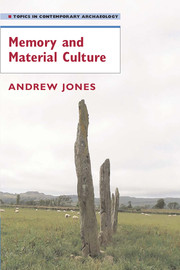Book contents
- Frontmatter
- Contents
- Preface
- 1 Memory and Material Culture?
- 2 From Memory to Commemoration
- 3 People, Time, and Remembrance
- 4 Improvising Culture
- 5 Continuous Houses, Perpetual Places: Commemoration and the Lives of Neolithic Houses
- 6 Culture, Citation, and Categorisation: Regionality in Late Neolithic Britain and Ireland
- 7 Chains of Memory: The Aesthetics of Memory in Bronze Age Britain
- 8 The Art of Memory: Memory, Inscription, and Place
- 9 Tracing the Past: Landscape, Lines, and Places
- 10 Coda
- References
- Index
1 - Memory and Material Culture?
Published online by Cambridge University Press: 07 December 2009
- Frontmatter
- Contents
- Preface
- 1 Memory and Material Culture?
- 2 From Memory to Commemoration
- 3 People, Time, and Remembrance
- 4 Improvising Culture
- 5 Continuous Houses, Perpetual Places: Commemoration and the Lives of Neolithic Houses
- 6 Culture, Citation, and Categorisation: Regionality in Late Neolithic Britain and Ireland
- 7 Chains of Memory: The Aesthetics of Memory in Bronze Age Britain
- 8 The Art of Memory: Memory, Inscription, and Place
- 9 Tracing the Past: Landscape, Lines, and Places
- 10 Coda
- References
- Index
Summary
Human memory is fragile and finite. We mentally store our experiences as memories. However, memories are easily forgotten, and the retrieval of memories, through the act of remembering, is inexact and faulty. Due to our finite ability to mentally store our memories, human societies have produced a series of devices for storing memory in extrabodily form. These have included notched bone implements, clay and stone tablets, carved stelae, and, at a later stage in history, maps, drawings, photographs, phonographs, and other recording technologies, and, finally, the computer. Each of these offers an increasing capacity for the storage of memory. Each new technology therefore acts as an ever more efficient prop for human memory.
A version of these views can be found in the discourse of a number of disciplines whose purpose it is to debate the development and structure of the human mind – from psychology and cognitive science to philosophy, anthropology, and archaeology. They also represent a kind of ‘folk model’ of memory, which is broadly representative of the experience of memory for the majority of people raised in Western society. The aim of this book is to question the validity of these views, especially as they pertain to the study of material culture. I argue that such views are predicated on a modernist assumption of the differentiation amongst mind, body, and world. In fact, to assume such a distinction throughout the course of human history is to overlay a series of modernist assumptions upon the distant past.
- Type
- Chapter
- Information
- Memory and Material Culture , pp. 1 - 26Publisher: Cambridge University PressPrint publication year: 2007

